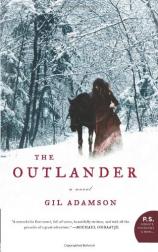Reading Group Guide
Discussion Questions
The Outlander

1. When we meet the widow, she is emotionally remote, frightened, and unable to form a plan. She has a strong will to survive, but few skills. By the end of the book she seems like a different woman. Is she a different person, or the same person with new skills? Never mind fictional characters, is it possible for people to change?
2. What is the cause of the widow's madness? Is this a manifestation of severe post-partum depression, or has Mary always been a little off? Will she always be, or is there some hope?
3. Regarding religion, the author says of Mary that "she had a child's disinterest in any father other than her own." Does Mary truly understand faith? Does she herself have any faith? Has she has been given any real instruction in faith? Does one need instruction? Of all the characters in this novel, who has the greatest sense of faith, or of the divine?
4. What motivates the bird lady to take in "strays and lame ducks"? She is described as a Good Samaritan --- do you think she is one? Why are Zenta and Jeffrey so protective of her? Also, she tells the widow that the maid Zenta "dislikes you more than any other person I've brought to the house." Is there something about Mary that is different than the other "lame ducks"?
5. The names in this novel are out of a fairy tale: the widow, the Ridgerunner, the Reverend, the giant, the dwarf. Why did the author decide to choose such archetypal monikers for her characters? Do the characters come across as archetypes, or as fleshed-out personalities?
6. While sewing an injured miner's wound closed, Mary thinks "This is what the embroidery lessons were for." Did you learn anything new about women's (and men's) lives at the turn of the last century? Is historical detail important to you, or do you pay most attention to the story and character?
7. At one point, the widow realizes she has found "a kind of amnesty" with the Reverend. Is amnesty different from forgiveness? Do you think Mary wants forgiveness, or that she forgives herself?
8. The natural world itself is almost a character in The Outlander. Different characters have different relationships with it. For instance, in the "fine black boots," the twins seem out of place in the mountains, while William Moreland has been content to live alone in the wilderness for over a decade. What was your feeling about this element of the novel? In real life, have most of us lost a sense of the natural world?
9. After the avalanche, the widow lies in McEchern's store "as if dead" and thinks "he is gone, he is gone." It seems clear she is thinking of Bonny --- but perhaps her lament for "him" is wider than that. What have men meant to her over the span of this novel?
10. After the landslide, Mary registers a change in herself. She is "like a different woman, one direly accustomed to loss. With nothing to her name, she had simply let go, let go of everything." What has she been holding onto? What does letting go accomplish?
11. "Find me." Why does Mary leave at the end? Does she want to live alone, as Moreland has --- or is it a lover's game? Will the Ridgerunner have much trouble finding her? Where will she/they go now? Deeper into the wild, or toward civilization?
The Outlander
- Publication Date: June 30, 2009
- Paperback: 416 pages
- Publisher: Harper Perennial
- ISBN-10: 0061491349
- ISBN-13: 9780061491344







